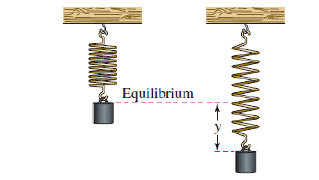A weight is oscillating on the end of a spring (see figure). The position of the weight relative to the point of equilibrium is given by  , where y is the displacement (in meters) and tis the time (in seconds). Find the times when the weight is at the point of equilibrium (y= 0) for
, where y is the displacement (in meters) and tis the time (in seconds). Find the times when the weight is at the point of equilibrium (y= 0) for![]()
src="https://sciemce.com/media/3/ppg__cognero__Section_5.3_Solving_Trigonometric_Equations__media__9cf10ab8-f32f-4ce6-91ab-d5d8a66cf629.PNG" style="font-size:12pt;font-family:'times new roman';vertical-align:middle;" />.
?
?
?
A. 0.05sec, 0.49sec, 0.94sec
B. 0.05sec, 0.05sec, 0.94sec
C. -0.40sec, 0.49sec, 0.94sec
D. -0.40sec, 0.49sec, -0.40sec
E. 0.05sec, -0.40sec, 0.94sec
Answer: A
You might also like to view...
The graph of the given function is drawn with a solid line. The graph of a function, g(x), transformed from this one is drawn with a dashed line. Find a formula for g(x).f(x) = 

A. g(x) = 
B. g(x) = 
C. g(x) = 2
D. g(x) =  + 2
+ 2
Find the effective rate of interest.9% compounded continuously
A. 9.451% B. 9.374% C. 9.089% D. 9.417%
Solve the problem.The number of students in a school in year n is estimated by the model . About how many students are in the school in each of the first three years?
. About how many students are in the school in each of the first three years?
A. 102, 134, 178 B. 102, 134, 160 C. 116, 148, 192 D. 108, 134, 178
Solve the problem.In an economics study, three quantities m, p, and q have been found to be related by the equation m = p1/2 ? q1/2. Find m, if p = 16 and q = 9.
A. 7 B. 36 C. 12 D. 144
